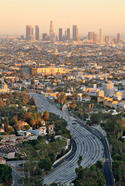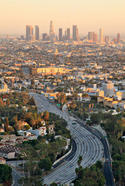“Human happiness,” the Greek historian Herodotus once observed, “does not abide long in one place.” In its 240 years or so of existence, the United States has experienced similar ebbs and flows, with Boston replaced as the nation’s commercial capital first by Philadelphia and then by New York. The 19th century saw the rise of frontier settlements—Cincinnati, Pittsburgh, Cleveland, and finally Chicago—that also sought out the post position. In the mid 20th century, formerly obscure Los Angeles emerged as New York’s most potent rival. read more »
Los Angeles
Southern California Becoming Less Family-Friendly
The British Talmudic scholar Abraham Cohen noted that, throughout history, children were thought of as “a precious loan from God to be guarded with loving and fateful care.” Yet, increasingly and, particularly, here in Southern California, we are rejecting this loan, and abandoning our role as parents. read more »
L.A. Hanging on as a Top Global City
For more than a century, Southern Californians have dreamed of their region becoming host to a great global city. At the turn of the 20th century Henry Huntington, who built much of the area’s first mass-transit system, proclaimed that “Los Angeles is destined to become the most important city in the world.”
Of course, builders of other cities – St. Louis, New Orleans, Chicago and even Cincinnati, Ohio – have made similar predictions. But L.A.’s claim, unlike the others, had a significant resonance. Not only was the region growing rapidly throughout the previous century, and now stands as North America’s second-largest population center, but it dominated a host of fields, notably entertainment and aerospace, and was highly influential in energy, fashion and manufacturing. read more »
The World's Most Influential Cities
In the past century, the greatest global cities were generally the largest and centers of the world’s great empires: London, Paris, New York and Tokyo. Today size is not so important: Of the world’s 10 most populous cities, only Tokyo, New York and Beijing are in the top 10 of our ranking of the world’s most important cities. Instead, what matters today is influence. read more »
- Login to post comments
California Drought: How To Share An Emergency
California has big troubles. It hasn’t rained for two years. Our reservoirs are almost depleted. Our aquifers are being overdrawn. Forecasts for next winter’s rain, which were optimistic not long ago, have become increasingly pessimistic. read more »
Don't be so Dense About Housing
Southern California faces a crisis of confidence. A region that once imagined itself as a new model of urbanity – what the early 20th century minister and writer Dana Bartlett called “the better city” – is increasingly being told that, to succeed, it must abandon its old model and become something more akin to dense Eastern cities, or to Portland or San Francisco.
This has touched off a “density craze,” in which developers and regulators work overtime to create a future dramatically different from the region’s past. This kind of social engineering appeals to many pundits, planners and developers, but may scare the dickens out of many residents. read more »
The California Economy: A Strength Vs Weakness Breakdown
Part two of a two-part report. Read part 1.
The problem with analyzing California's economy — or with assessing its vigor — is that there is not one California economy. Instead, we have a group of regions that will see completely different economic outcomes. Then, those outcomes will be averaged, and that average of regional outcomes is California's economy. It is possible, even likely, that no region will see the average outcome, just as we rarely see average rainfall in California. read more »
- Login to post comments
The California Economy: When Vigor and Frailty Collide
Part one of a two-part report
California is a place of extremes. It has beaches, mountains, valleys and deserts. It has glaciers and, just a few miles away, hot, dry deserts. Some years it doesn't rain. Some years it rains all winter. Those extremes are part of what makes California the attractive place that it is, and, west of the high mountains, California is mostly an extremely comfortable place to live. read more »
Sterling, the Clippers, and $2B of Monopoly Money
Is there a more crooked roulette wheel than the one that spins around in the circles of professional sports? I ask in the context of the punishment meted out to Donald Sterling, the in-limbo owner of the Los Angeles Clippers, who, for his commentaries about race in America, was banned from the league and might be “forced” to sell his team for $2 billion, about $1.5 billion more than it was worth before his girlfriend taped their tawdry talks. read more »
- Login to post comments
The Ugly City Beautiful: A Policy Analysis
When it comes to the future, Detroit and San Francisco act as poles in the continuum of American consciousness. Detroit is dead and will continue dying. San Francisco is the region sipping heartily from the fountain of youth. Such trajectories, according to experts, will go on indefinitely.
Harvard economist Ed Glaeser has a grim outlook for the Rust Belt. “[P]eople and firms are leaving Buffalo for the Sunbelt because the Sunbelt is a warmer, more pleasant, and more productive area to live,” he writes in City Journal.
Glaeser echoes this sentiment in a recent interview with International Business Times, saying “[s]mart people want to be around other smart people”, and the Rust Belt has a long slog ahead given that “post-industrial city migration is dominated by people moving to warmer climes”.
But is this true? read more »






















